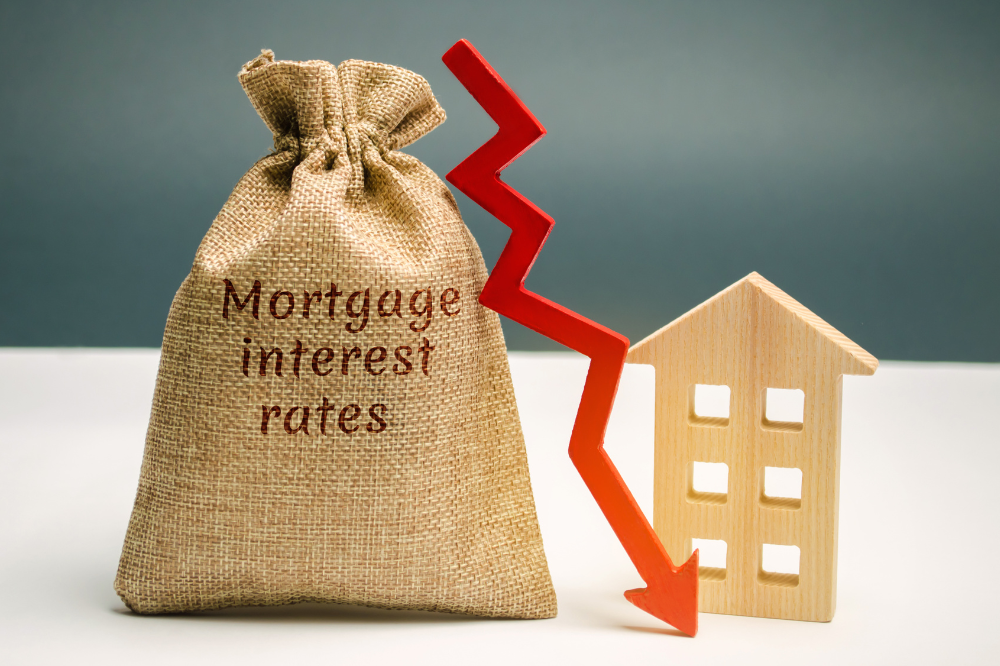Separation or divorce can bring many financial complications, especially when a mortgage is involved. It's not unusual for one person to either remain in the home or move out and stop contributing to the mortgage, leaving the other to manage payments alone.
Government figures show that nearly 30,000 divorce applications were made in the first quarter of 2025, highlighting just how many couples are facing this situation. For many, the family home is the biggest shared asset, which can make decisions about what to do next even more difficult.
It’s often hard to know where to begin when dealing with your finances during a separation. This guide outlines what happens to a mortgage during divorce, the risks of falling behind on payments, how to protect your credit score, and what to do if your property is in negative equity.
Divorce and Mortgage Default
When a couple separates and they share a mortgage, questions often arise around who is responsible for the monthly payments. In most cases, both parties are jointly liable. Even if one partner has moved out, both names on the mortgage mean both people remain legally responsible for the full amount.
If payments are missed during the separation process, this is classed as mortgage default. It can lead to late fees, damage to both credit scores, and ultimately, repossession of the property if the arrears are not cleared.
Some common situations that lead to mortgage default during divorce include:
- One person refusing or being unable to pay their share
- Confusion over who is responsible for payments after moving out
- Delays in sorting financial settlements or selling the home
What If My Ex Stops Paying Their Share?
If your ex-partner has stopped contributing to your joint mortgage, it can place a serious financial burden on you, especially if you’re still legally responsible for the full repayment. Whether you’re still living in the home or not, you both remain jointly liable for the mortgage unless it has been refinanced or legally amended. Here are some options you may want to consider:
1. Speak to Your Lender Early
Your first step should be to contact your mortgage provider. Lenders are generally more supportive when they’re informed early, and they may be able to offer temporary support, such as a payment holiday, interest-only payments, or an extended term.
While these options are not permanent, they can give you some breathing space while you explore longer-term arrangements.
2. Check Your Legal Position
If your ex-partner has stopped paying but you're still paying their share, it might be possible to reclaim the unpaid portion through legal routes, particularly if there is a court order (such as a Mesher or Martin Order) in place.
3. Refinance the Mortgage in Your Name
If you can afford the repayments alone, you may be able to remortgage the property and remove your ex-partner from the mortgage entirely. The lender will assess your income, credit history, and affordability to see if this is viable. To work out if you can afford repayments on your mortgage, use our mortgage repayment calculator
Keep in mind that even if your ex agrees to sign over their share of the home, the lender has to approve the change for the mortgage to be legally updated.
4. Consider Selling the Property
If neither of you can afford the mortgage alone, selling and moving home might be the most practical option. Once sold, the mortgage can be repaid in full and any remaining equity divided. If the property is in negative equity, you’ll need to speak to your lender about how to handle the shortfall.
5. Apply for a Transfer of Equity
A transfer of equity allows one person to be removed from both the mortgage and the legal ownership of the property. This process typically requires approval from your mortgage lender and legal support. You’ll need to show that you can afford the repayments on your own. In some cases, stamp duty may be payable on the equity being transferred. You can check how much this might cost using our stamp duty calculator.
6. Get Mediation or a Court Order
If your ex-partner refuses to cooperate or you can’t reach an agreement, mediation or family court might be necessary. The court can issue orders relating to the home and mortgage responsibilities. These decisions often consider who is the primary carer of children and what is financially fair.
Can I Stop Paying My Mortgage During Divorce?
Stopping mortgage payments altogether is not advisable unless agreed with your lender. Mortgage default can stay on your credit file for six years, making it more difficult to remortgage or take out loans in the future.
Even if you have left the property, you are still liable if your name is on the mortgage. If you are unable to keep up with payments, speak with your lender or a mortgage advisor about temporary solutions.
In some cases, you may be able to switch to interest-only payments or extend the mortgage term to reduce costs during separation.
Who Stays in the House?
Deciding who keeps the property and stays in the house during a divorce depends on several factors, including how the home is owned, whether there are children involved, and the financial positions of each person.
If the home is jointly owned, both parties have legal rights to the property. In this case, it may be sold and the proceeds divided, or one person may buy the other out. If only one person is named on the mortgage or deeds, it doesn't necessarily mean the other has no rights, particularly if the property was the family home or both parties contributed to its upkeep.
Courts in England and Wales don’t automatically split everything 50/50. Instead, they aim for a fair outcome based on individual circumstances, such as:
- The welfare of any children
- Each party’s income, financial needs, and housing needs
- The length of the marriage
- Contributions (financial and non-financial) to the home and family life
A property settlement can be agreed informally, through mediation, or by a court order if no agreement is reached. It’s strongly advised to seek legal advice before making any decisions regarding ownership or sale of the property.
Can My Ex Take Over the Mortgage?
Your ex-partner can take over the mortgage in full if they can afford it and the lender agrees. This is usually done through a process called a "transfer of equity."
The lender will carry out an affordability check to make sure your ex can meet the repayments alone. If approved, your name will be removed from the mortgage.
Bear in mind that you will also need to transfer the property ownership via the Land Registry, which may involve legal costs.
Can I Buy My Partner Out?
Yes, it is possible to buy your partner out of a property during or after a separation, but certain factors need to be considered. Buying out your partner means taking over their share of the equity and potentially the mortgage, which usually requires a property valuation and legal agreement.
You'll need to determine how much their share is worth and either pay them directly or adjust the division of other assets to reflect the value. If there’s a mortgage involved, you’ll also need to prove to the lender that you can afford the repayments on your own to have the mortgage transferred solely into your name.
What If the Property Is in Negative Equity?
When a property is in negative equity, it means the mortgage balance is higher than the current market value of the property, often due to a drop in property prices or insufficient repayment of the mortgage. This can become particularly problematic during a divorce, when both parties may be looking to sell the property or separate their financial responsibilities.
If the property is sold while in negative equity, the couple would need to cover the shortfall between the sale price and the remaining mortgage, something that may not be financially viable, especially if legal fees and living costs are already mounting. Remortgaging to transfer the mortgage into one person's name can also be difficult, as lenders are unlikely to approve new deals for properties with no equity.
If neither party can afford to take on the full mortgage or agree on a solution, and payments are missed, this can result in mortgage default. Defaulting not only damages credit scores but can also lead to repossession, further complicating the divorce process and leaving both parties with long-term financial consequences.
How Do I Remove My Ex from the Mortgage?
Removing your ex from the mortgage is possible through a transfer of equity, but it requires the lender’s approval. You will need to show that you can afford the mortgage on your own.
This process usually involves:
- A formal mortgage application in your sole name
- A credit check and affordability assessment
- Legal fees to update the mortgage and property ownership
If your lender does not agree to the transfer, your ex will remain financially liable even if they no longer live in the property.
How Do I Remove My Name from the Mortgage?
If you are moving out and want to be released from the mortgage, the process is the same; your ex must apply to take on the mortgage alone. If they cannot, both names may need to remain on the mortgage until the home is sold or refinanced.
It’s important not to stop paying unless you have written confirmation from the lender. Missed payments can damage your credit score and create legal issues.
Resources and Support
Dealing with mortgage issues during a divorce can be stressful and emotionally draining, but you don’t have to manage it alone. Many organisations and services in the UK offer guidance, financial advice, and legal support during this time.
Citizens Advice
Citizens Advice provides free, confidential advice on a wide range of issues, including housing, legal rights, and financial difficulties. They can help you understand your legal position and what steps to take if you're struggling with your mortgage.
MoneyHelper
MoneyHelper (formerly part of the Money Advice Service) offers impartial advice on money and divorce. Their website includes tools and calculators that can help you plan your finances and understand your mortgage options.
Shelter
Shelter is a housing and homelessness charity offering expert advice and legal support for people facing housing issues, including those at risk of repossession or who are unsure about their rights during separation.
Resolution
Resolution is a community of family law professionals committed to a constructive approach to divorce and separation. Their website allows you to find solicitors who specialise in family and housing matters.
Mortgage Brokers Specialising in Divorce
Separation and mortgage decisions can feel overwhelming, especially when emotions and finances are involved. Speaking to a mortgage broker or financial advisor can help you understand your options based on your circumstances.
Bell Financial Solutions focuses on helping people in separation or divorce situations. We can assess your current position and advise on the best next steps, whether that’s refinancing, buying out your ex-partner, or exploring specialist lenders.
If you’re concerned about mortgage payments during separation or want to explore your options, our qualified mortgage advisors can help you understand the best route forward, including remortgaging to buy out a partner or get a better deal. Get in touch today.



.avif)


